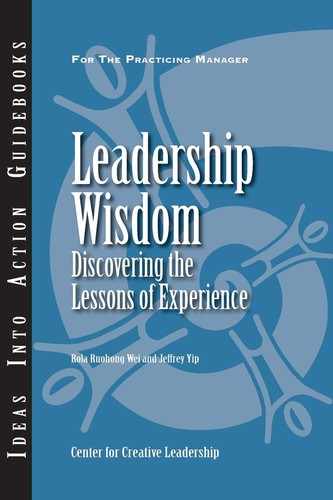
In a fast-paced global economy emphasizing innovation and productivity, leaders need to bring as much wisdom as possible to bear on their daily decisions. They often find themselves pulled between making decisions quickly and making them well. They are expected to make swift strategic choices in order to compete. Meanwhile, they have to carefully analyze situations to avoid making serious mistakes. In critical moments, leaders realize that the skills of business knowledge are limited in making good decisions. There is a need to reach deeper, to draw on the wisdom of experience and reflection to find the right course.

A difficulty that leaders face is that they are constantly overloaded with information varying in source, quality, and value. Wisdom becomes a crucial characteristic for leaders in order to survive in the fierce competition. The problem is that wisdom takes time to develop. The processes described in this guidebook can help accelerate the learning curve to enable leaders to apply wisdom to today’s challenges rather than yesterday’s missed opportunities.
Common myths about wisdom have depicted it as a mystic feature carried by very few people and extremely difficult to obtain. Those who possess it are either sages with no practical needs or desires, or very old people whose exceptional experiences accumulate over decades and allow them to see through things quickly.
Although wisdom is frequently referred to in its holistic form, research on cognitive psychology and intelligence has unveiled its nature and specified its core elements. Leaders with intellectual capabilities to make sound judgments, to learn from common experiences, and to embrace values that benefit both themselves and others are considered wise. In addition, what it takes to acquire wisdom is no longer mysterious. All leaders stumble upon countless events in their professional and personal lives, but research at the Center for Creative Leadership has found that only those who learn from the experiences of others, as well as from their own, can excel. There is no way that you can change the past, but it is possible to improve your ability to learn from the past and thus to develop your wisdom.
In this guidebook, you will learn
• What kind of person can be considered a wise leader
• How to assess leadership wisdom at the individual and organizational level
• How to develop leadership wisdom by asking questions
• How to develop leadership wisdom by reflecting on your own experience
Those who learn from the experiences of others, as well as from their own, can excel.
Leadership wisdom is developed by learning from your own experiences and those of others through reflection and inquiry. It is the ability to put into action the most appropriate behavior based on the realization of what is of value in life, for yourself and others. As a consequence, leadership wisdom enables you to effectively handle challenges associated with leadership tasks in setting direction, creating alignment, and maintaining commitment. Researchers such as Robert Sternberg and Clint Sidle have determined that leadership wisdom contains the following key characteristics:
Intellectual component. Leadership wisdom includes an intellectual ability to make judgments, weigh consequences, and consider multiple points of view. Leaders often face the cliché of being lonely at the top, and it is important for them to get various perspectives from their colleagues and friends regarding the best ways to handle difficult situations. It is even more crucial for them to make sound judgments based on various and sometimes conflicting opinions.
Action component. It is not enough for leaders to be intellectually capable of making the right judgment. Wise individuals have to be result oriented and action driven. They never wait till the momentum gets lost. Instead, they put into action the most appropriate behavior demanded by the situation immediately after the judgment is made, build strong teams and operational systems to implement the plans, and regularly check to assure the efficiencies of the system.
Value component. Although wise leaders are swift in making judgments and putting things into action, the whole process has to be directed by values that move beyond individualistic concerns to more collective or universal issues. Leaders who pay attention only to short-term gains and self-interest lack the vision to lead an organization toward sustainability in the long run.
Adaptive component. Leadership wisdom includes the ability to effectively handle challenges associated with leadership tasks that are uncertain and problematic. Leaders need to set directions and create visions for the team members as well as the organization, align employees’ energy and actions with organizational goals, and inspire employees to maintain their commitment level. Leadership wisdom enables individuals to manage these complex tasks effectively.
Assessing Leadership Wisdom
Leadership wisdom includes maturity on both cognitive and emotional dimensions. Wise leaders have intellectual capacity as well as the ability to manage their own emotions and those of others. They practice the values that they advocate for themselves and for the organizations that they lead. You can use the checklist on page 11 to reflect on your own level of leadership wisdom.
